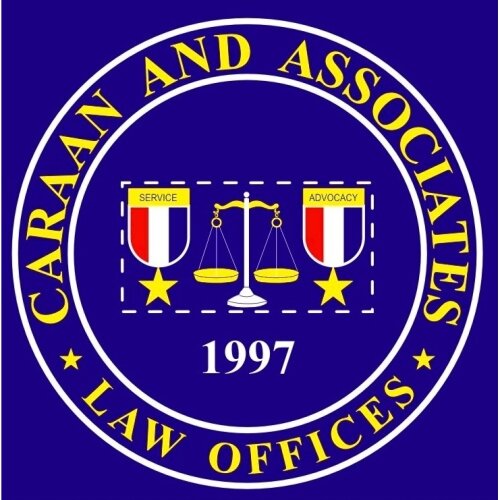Best Energy, Environment & ESG Lawyers in Manila
Share your needs with us, get contacted by law firms.
Free. Takes 2 min.
List of the best lawyers in Manila, Philippines
About Energy, Environment & ESG Law in Manila, Philippines
Energy, Environment, and ESG (Environmental, Social, and Governance) law in Manila, Philippines covers a wide range of legal issues involving energy production and consumption, natural resource management, environmental protection, and sustainable business practices. As the capital city, Manila faces unique challenges such as urban pollution, increased energy demand, and rapid industrialization. Legal frameworks have been implemented to regulate these areas and ensure that businesses meet both local and international standards on environmental responsibility and sustainable operations.
Why You May Need a Lawyer
There are several circumstances where legal expertise in energy, environment, and ESG becomes essential. Common situations include:
- Starting or operating a business that generates or consumes significant energy
- Securing environmental permits for construction or industrial projects
- Facing regulatory action for pollution or non-compliance with environmental laws
- Participating in renewable energy projects or government energy programs
- Mergers, acquisitions, or investments involving environmental compliance or liabilities
- Developing or reviewing ESG policies for corporate governance
- Disputes with local communities over environmental impacts
- Responding to government inspections or sanctions
- Understanding and implementing sustainability reporting requirements
- Pursuing remedies for environmental damage or pollution
Having a lawyer ensures your actions comply with current regulations, mitigates risks of penalties, and helps you make informed decisions for your business or personal interests.
Local Laws Overview
Several important laws and regulations shape the energy, environment, and ESG landscape in Manila and the broader Philippines. Key legislation includes:
- Clean Air Act (Republic Act No. 8749) - Sets standards for air quality, regulates emissions, and creates mechanisms for pollution control.
- Ecological Solid Waste Management Act (Republic Act No. 9003) - Mandates proper waste segregation, collection, and disposal practices.
- Renewable Energy Act (Republic Act No. 9513) - Promotes the development and utilization of renewable energy sources.
- Environmental Impact Statement System (Presidential Decree No. 1586) - Requires certain projects to undergo environmental impact assessments before approval.
- Climate Change Act (Republic Act No. 9729) - Establishes policies on climate change mitigation and adaptation.
- Philippine Energy Efficiency and Conservation Act (Republic Act No. 11285) - Focuses on energy efficiency programs and standards for businesses.
- Philippine ESG Reporting Standards - Increasingly, companies are expected to disclose their environmental and social risks as part of good governance.
National agencies and local government units enforce these laws in Manila, ensuring that businesses and individuals operate within legal boundaries and contribute to sustainable development goals.
Frequently Asked Questions
What is ESG, and why is it important in the Philippines?
ESG stands for Environmental, Social, and Governance. In the Philippines, it relates to how businesses address environmental impacts, practice responsible management, and implement policies that benefit both society and stakeholders. Strong ESG practices are increasingly required by investors and regulators, helping companies mitigate risks and improve their reputation.
Do I need a permit before starting a construction project in Manila?
Yes. Many construction projects require environmental compliance certificates and permits from agencies such as the Department of Environment and Natural Resources (DENR) and local government units, especially if the project could impact the environment.
Who enforces environmental laws in Manila?
The DENR, Environmental Management Bureau (EMB), local government units, and special bureaus like the Metro Manila Development Authority (MMDA) are responsible for monitoring compliance and enforcing environmental laws in Manila.
What are the penalties for violating environmental regulations?
Penalties can include administrative fines, orders to cease operations, imprisonment, and even closure of business establishments depending on the severity and nature of the violation.
How can my business comply with ESG standards?
Comply by adopting sustainable practices, obtaining relevant permits, conducting regular environmental assessments, maintaining records, and submitting required reports such as sustainability or compliance reports.
Are renewable energy projects encouraged in Manila?
Yes. Government policies and incentives encourage the use of renewable energy such as solar, wind, and biomass, with tax breaks and easier permitting processes available for compliant projects.
What is an Environmental Impact Assessment (EIA)?
An EIA is a process that evaluates the potential environmental effects of a proposed project. It is often required before government agencies grant project approvals, especially for developments that may have significant environmental impacts.
Can I contest a government notice for environmental violation?
Yes. You can challenge such notices by presenting your case during administrative hearings or by consulting a lawyer to assist with filing appeals or other legal remedies.
Does the law require companies to disclose ESG risks?
While not all companies are included, public companies and certain large businesses may be required to file sustainability reports in line with Philippine ESG guidelines and stock exchange requirements.
Where do I go if I witness environmental law violations in Manila?
You can report violations to the DENR, EMB, local government units, or hotlines set up by agencies such as the MMDA. Many agencies offer online platforms for public complaints and reporting.
Additional Resources
Below are some relevant agencies and organizations that provide information and support related to energy, environment, and ESG concerns in Manila:
- Department of Environment and Natural Resources (DENR)
- Environmental Management Bureau (EMB)
- Energy Regulatory Commission (ERC)
- Department of Energy (DOE)
- Climate Change Commission (CCC)
- Metro Manila Development Authority (MMDA)
- Philippine Green Building Council (PHILGBC)
- Philippine Business for Social Progress (PBSP)
- Securities and Exchange Commission (for disclosures and reporting standards)
- Integrated Bar of the Philippines (for lawyer referrals)
Next Steps
If you believe you need legal assistance in energy, environment, or ESG matters in Manila, begin by determining your specific needs or concerns. Gather relevant documentation such as permits, notices, or contracts. Consider scheduling a consultation with a lawyer who specializes in environmental or energy law. You can also contact the abovementioned government agencies for preliminary guidance. When choosing a legal adviser, check their experience with relevant laws and their track record in similar cases. Taking these steps early can help you avoid legal pitfalls and ensure compliance for your business or personal activities.
Lawzana helps you find the best lawyers and law firms in Manila through a curated and pre-screened list of qualified legal professionals. Our platform offers rankings and detailed profiles of attorneys and law firms, allowing you to compare based on practice areas, including Energy, Environment & ESG, experience, and client feedback.
Each profile includes a description of the firm's areas of practice, client reviews, team members and partners, year of establishment, spoken languages, office locations, contact information, social media presence, and any published articles or resources. Most firms on our platform speak English and are experienced in both local and international legal matters.
Get a quote from top-rated law firms in Manila, Philippines — quickly, securely, and without unnecessary hassle.
Disclaimer:
The information provided on this page is for general informational purposes only and does not constitute legal advice. While we strive to ensure the accuracy and relevance of the content, legal information may change over time, and interpretations of the law can vary. You should always consult with a qualified legal professional for advice specific to your situation.
We disclaim all liability for actions taken or not taken based on the content of this page. If you believe any information is incorrect or outdated, please contact us, and we will review and update it where appropriate.
Browse energy, environment & esg law firms by service in Manila, Philippines
Manila, Philippines Attorneys in related practice areas.















